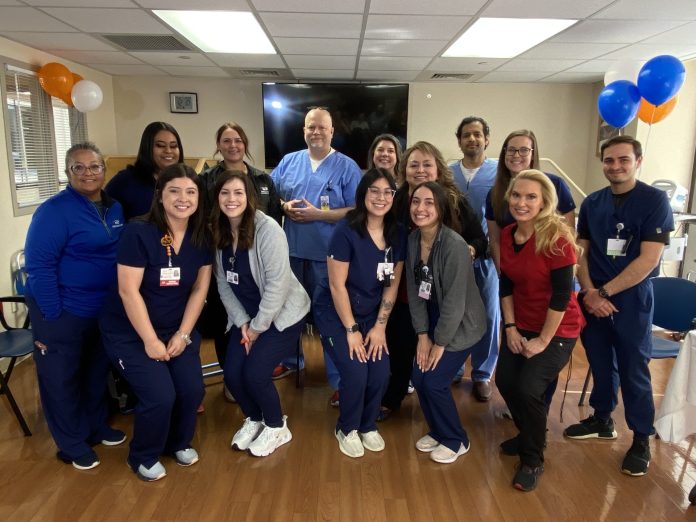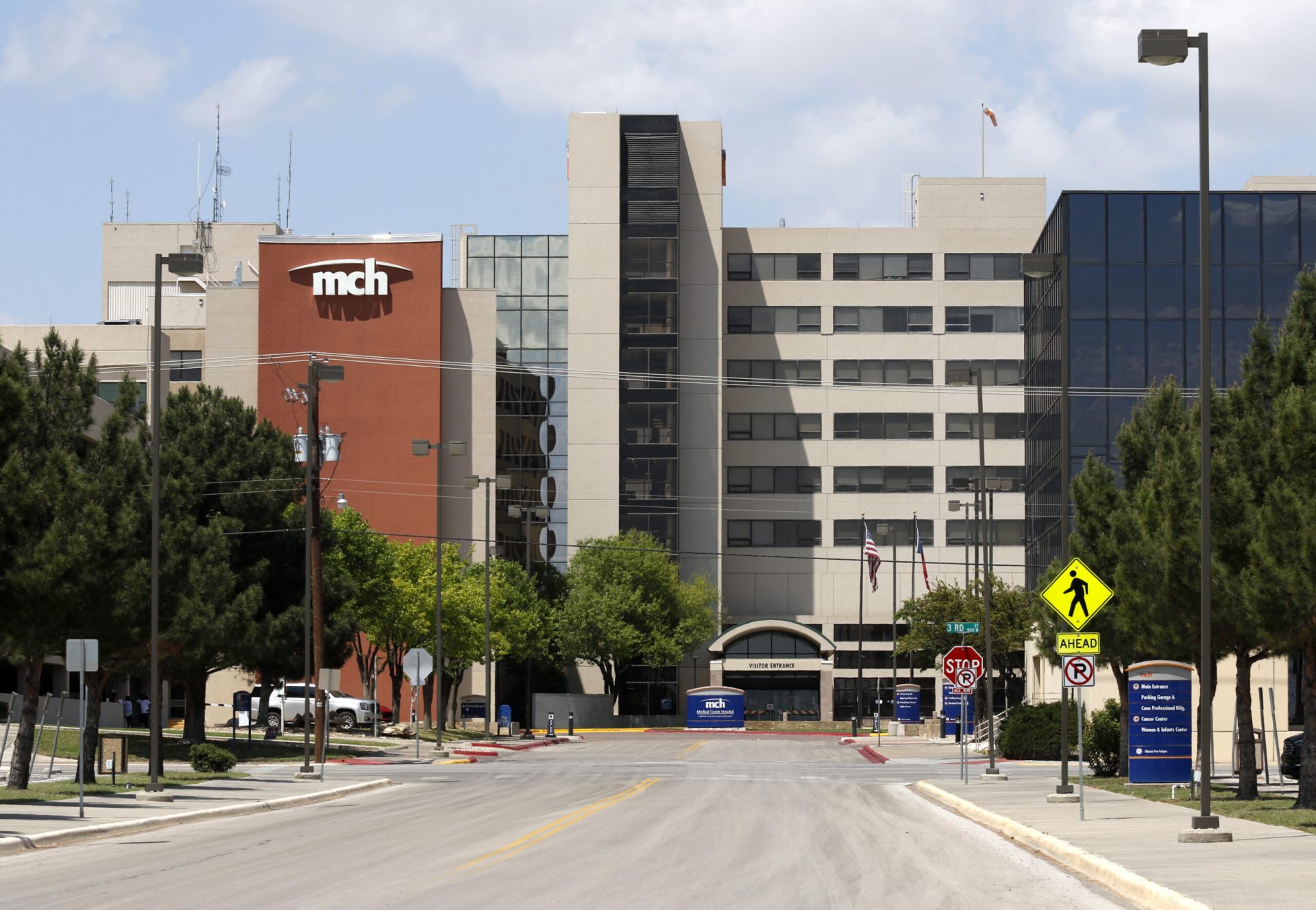
Although its joint replacement program has been around for a while, this is the first year Medical Center Hospital has received recognition with an Advanced Hip & Knee Replacement Certification from DNV.
The certification affirms MCH’s excellence in orthopedic surgery within the scope of hip and knee arthroplasty and related procedures inclusive of initial diagnostic services, surgical services, and therapies related to hip and knee replacement care.
DNV is a Norwegian company that provides services related to quality management, risk assessment, and sustainability.
Joint Care Coordinator Martha McCown said it is also a way for patients to see that the quality of their procedures — from the time patients decide they want surgery to the time they are done with the procedure — is monitored and standardized at the best practice level.
Patient education, which McCown provides before surgery, is required through the accreditation. They have to be accredited annually.
“They have different things that are required and then they will monitor to see that we’re hitting those markers consistently. Each year that we have to do the accreditation they will focus on a different area,” McCown said.
Orthopedic surgery specialist Dr. Vijay Borra said recovery for joint replacement patients is a lot faster than it used to be.
“There’s rapid mobilization of patients after surgery, so we’re getting them up pretty soon — within two to three hours of surgery — and walking. We ambulate them fairly quickly after surgery. We have like a rapid recovery protocol that we use,” Borra said. “The hospital is also investing in robotics. We’re hoping to get a total knee robot before the end of the year, so we will be doing robotic knee replacements; anterior hip replacements on qualified patients, which allows them a faster recovery.”
“In addition to doing primary joint replacements, we also do revisions where people had surgeries done 15, 20 years ago and the joint has worn out and they need a revision done. We do that as well,” Borra added.
He noted that most hip replacements in America are still performed without robots.
“The technology is still maturing, but for total knees, I would think the future is going to be robotic,” Borra said.
An anterior hip replacement is done with an incision in front, as opposed to the back, which allows for immediate flexion past 90 degrees.
But it depends on the hip. If it’s a re-do hip or revision hip, or if it’s a really bad hip, or bad hardware put in, then we tend to do it from the posterior, Borra said.
He added that the short-term outcomes are slightly different, but the long-term outcomes are the same.
“At six weeks, everybody’s the same, but for some people for whom they want to be able to bend down immediately to tie their shoelaces, it may be important that at six weeks the outcomes are more or less the same,” Borra said.
For a hip replacement, six weeks is the average recovery time, but knees tend to take a little longer, like eight to 12 weeks, Borra said.
“Hips tend to recover a little faster than knees,” he added.
For the overwhelming majority of patients, they don’t need to worry about the longevity of the implant. Depending on the patient’s weight, he typically tells them the implant will last 20 to 25 years.
He has performed hip replacements on patients as young as 22 up to approaching 90 years old.
The younger patients may have had hip dysplasia from birth.
“As long as physiologically they’re good, age is just a number,” Borra said.
The same with knees.

Before surgery patients may prefer non-operative interventions such as steroid injections, hyaluronic acid injections, physical therapy or aquatic therapy. Hyaluronic acid “is a natural substance found in the fluids in the eyes and joints,” the WebMD website said.
They do just about everything possible before deciding surgery is needed, tailoring it to the patients wants.
Borra said it also depends on how bad the X-ray is.
“If it’s mild arthritis, obviously, we’re going to try to max out that non-operative treatment before we think of surgery. If it’s bone on bone, then we may be more leaning towards surgery,” Borra said.
He added that they have always had “great outcomes at MCH.”
“As far as our complication rate, including infections, blood clots, implant-related complications, our outcomes are just as good or better than the national average. I think that DNV certification formally recognizes that to a certain extent,” Borra said.
McCown said when they started on the DNV journey, most everything that was required was already in place.
“It was just a matter of putting it down on paper and proving that everything that they required, we were already doing. We’ve been doing this for a long time. It was just going through the steps to getting it accredited,” McCown added.
Unlike other hospitals, which only do straightforward primary cases at MCH, they do first-time hip replacements and a heavy revision volume as well, Borra said.
Revisions are when people have had surgeries done elsewhere that fail, they had a procedure 20 years ago, and it’s failed, or if they have had fracture surgery where they’ve had plates and rods put in their head and it hasn’t worked out, Borra said.
“We do it all and we get referrals from all other hospitals. We do the whole thing and that kind of sets MCH apart from a lot of the other hospitals, not just here — Dallas, Houston that we do complex reduce that a lot of hospitals or surgeons will not touch,” Borra said.
The most common reason people need hip replacements is osteoarthritis.
“That’s going to be based on genetics, occupation, weight, so forth. A less common reason is … called avascular necrosis, where the hip deteriorates due to lack of blood supply. That has several causes, but for the most part, it’s osteoarthritis,” Borra said.
McCown said going through the education program before surgery helps them understand what to expect with the procedure and what to expect regarding planning ahead so they get the best outcomes.
“We have great surgeons, but if you go home and you’re not prepared for the assistance you might need at home or things of that nature, then it could pose a problem. I feel like it helps prepare those patients ahead of time,” McCown said.
Typically, total knee replacement lasts 45 minutes, the patient is up and walking within a couple of hours of surgery and they usually go home the next day, or if it’s a relatively active, younger patient, the same day.
Recovery time for knee replacement is eight to 12 weeks.
For a hip replacement, surgery usually lasts 45 minutes, the patient is walking right away and they are discharged the same day for younger patients and the next day for older ones.
“Recovery tends to be a little faster for hips — six to eight weeks,” Borra said.
If people have mild arthritis, most of the time, he said he recommends weight loss.
“Weight loss has been shown to be the most effective treatment as far as pain relief and then take over-the-counter medications as necessary … non-impact activities like (an) elliptical, a stationary bike,” Borra said.
With most insurance, such as Medicare or commercial payers, Borra said you can call his office directly without a referral.
“The only exception would be an HMO plan for which you need a referral from your primary care provider,” he added.
Borra said a third of his new patients come from direct calls to his office.
“They look online, or they’ve heard from other patients,” he said.
MCH has had a total joint rehabilitation program for more than 10 years.
“This is going to be the first year of the DNV accreditation,” Borra said.



